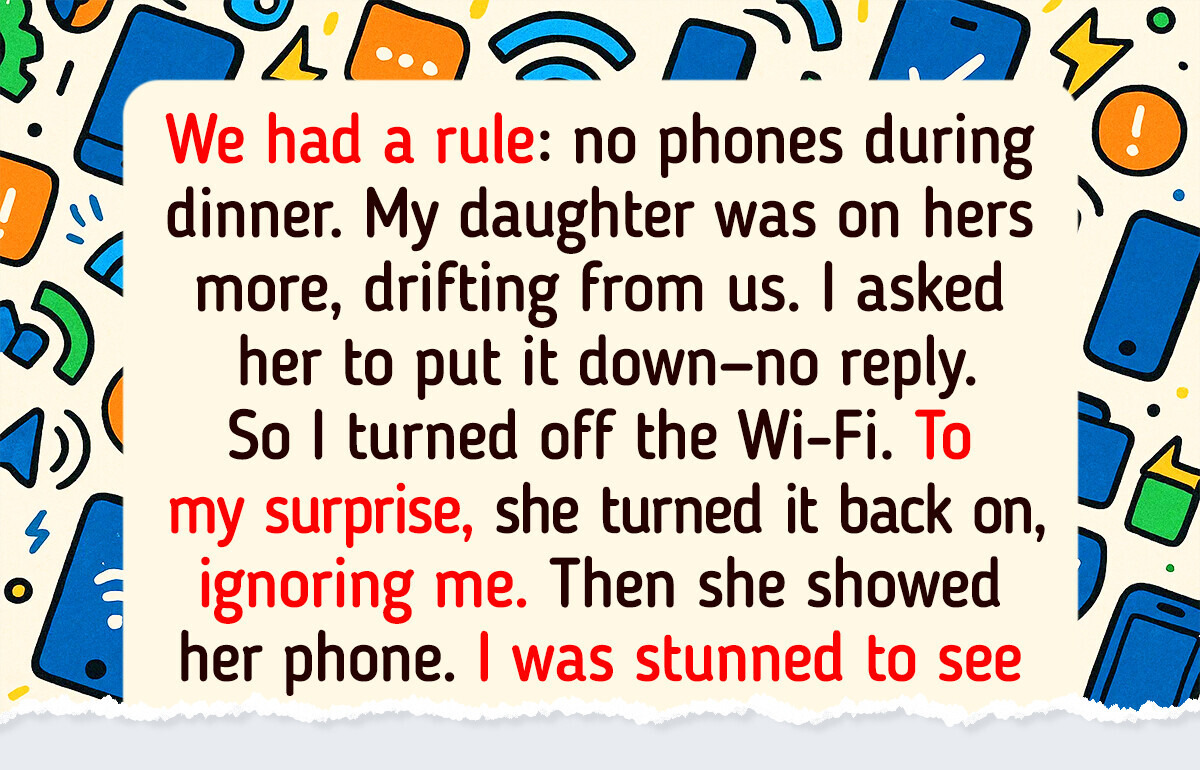I Wanted to Support My Boyfriend, Not Be His Mother—Now I’m Questioning Everything


Parenting in the modern world is both a beautiful journey and a daunting challenge. With technology deeply woven into daily life, parents often find themselves navigating complex choices—especially when it comes to screen time. This is a story of one such decision, made in the hope of reconnecting with a daughter who seemed to be slipping away.
Hey Bright Side!
We had a rule: no phones during dinner. My daughter was on hers more, drifting from us. I asked her to put it down—no reply. I asked again. Still nothing. So I turned off the Wi-Fi.
To my surprise, she turned it back on, ignoring me. Then she showed her phone. I was shocked to see a message to a friend: “Can you come get me? I’m done with all their pointless boundaries.”
She’d been spending more time on her phone, drifting away from us. So, we set limits. But she blamed us—her friends were pulling away because she wasn’t keeping up with trends.
Later, we discovered the same group was skipping classes and running toxic gossip accounts, pulling her deeper into their world. What she saw as control was really protection.
Later, a friend called — worried they were using her personal details. When I clicked on one of the accounts I saw my daughter’s nasty post, I called the police. When my daughter found out, she accused us of causing the drama, saying we were the source of her stress and shame.
Was it wrong to set boundaries and limit her screen time? And how do we move forward from here?
That’s an incredibly difficult and emotionally charged situation—one many modern parents can relate to. You’re trying to protect your child, but they see it as control or punishment. Here are some pieces of helpful advice for navigating this with care, clarity, and long-term connection.
Learning how to stay calm when you’re under pressure isn’t always easy, but it’s a great skill to cultivate. Your daughter may lash out emotionally, but it’s essential you stay grounded. Reacting with anger will only widen the gap. Stay calm, firm, and compassionate when enforcing boundaries—consistency builds trust, even if it takes time to show.
Setting boundaries can be challenging, especially if you have a big heart and care deeply about the people around you. Teens often interpret rules as punishment.
Instead of saying “You can’t use your phone”, try “I care about your well-being, and I want to help you stay safe. Let’s talk about how to balance tech in a way that supports you.” Framing rules as protection, not control, helps shift the narrative.
To further strengthen your relationship, spend one-on-one time with your child doing activities that they enjoy. This will help your child feel loved, valued, and supported. Create small, meaningful moments offline. Go for walks, cook together, or find a mutual hobby.
You’re not just pulling her away from screens—you’re inviting her back to connection. Slowly, trust is built through shared experiences, not lectures.
Parenting isn’t about being perfect; it’s about being intentional. So, if you’ve ever felt like you’re losing your child to a screen... what would you be willing to change to bring them back?











